15 Years On, Georgia’s Scars of War Refuse to Heal, But Who’s at Fault?
BY MICHAEL GODWIN
This week, 15 years ago, Georgia was one of the first in the 21st century to face the wrath of the Kremlin’s foreign policy machinations. To commemorate the occasion, Prime Minister Irakli Garibashvili and his retinue attended a memorial ceremony at the nation’s military cemetery where the Georgian warriors that fell during the war had been laid to rest. Shaking hands and embracing family members of these heroes, the Prime Minister made statements that sparked controversy with many, including the opposition. This controversy surrounds the observed date of the beginning of the war. While many online refer to the beginning of formal hostilities as August 7th, the Government of Georgia and others claim this was not official until the following day. Most military analysts and enthusiasts agree that the true roots of the war go much farther back, and the debate sparked by recent statements hinges on a matter of hours and varying reports that come out of the fog of war.
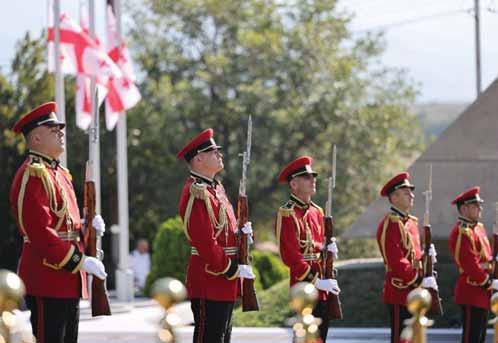
In this week’s issue...
Ukraine Latest: Explosion at Military Supply Plant near Moscow Injures 45; UN Condemns Strikes on Pokrovsk
POLITICS PAGE 4
Award-Winning Writer Jonathan Littell on 2008, Sarkozy, Misha, and the Russian Apathy

POLITICS PAGE 5
Majid Al Futtaim Retail Launches Retail Graduate Program to Empower Next Generation of Carrefour Leaders
BUSINESS PAGE 7
ibis Hotel Brands: Revolutionizing the Tourism Industry with Modern Economy Class
BUSINESS PAGE 8
Legal Insights with Klein Law: Georgia for Digital Nomads - Ease of Renting a Flat and Opening a Bank Account
BUSINESS PAGE 8
Prospero’s Coffee Haven: Where Coffee Craftsmanship Meets Literary Respite
BUSINESS PAGE 9
USAID YES-Georgia Organizes Information Media Tour in Tbilisi and Imereti Regions
10
Issue no: 1411 • • AUGUST 11 - 17, 2023 • • PUBLISHED WEEKLY
PRICE: GEL 2.50
PAGE
SOCIETY
Continued on page 3
Georgia fights to recover from Racha landslide tragedy PAGE 2
Georgian Honor Guard at the military cemetery near Tbilisi. Photo source: Press Office of the Government Administration FOCUS ON SHOVI
Image by Daria Tsintsadze
Tragedy Strikes ShoviLandslide Disaster Claims Lives and Spurs Global Response
willingness to contribute. The plea for detailed satellite images captured international attention, prompting discussions on bolstering predictive technologies and global cooperation in disaster management.
sat and the picture will be clearer and cloud free! Please! Help us!" she wrote.
BY MARIAM GORKHELASHVILI
In a heartbreaking turn of events, on August 3, the picturesque town of Shovi, nestled in the west of Georgia, was plunged into chaos when a devastating mudslide, triggered by a massive landslide, engulfed the area surrounding the Sunset Shovi hotel and nearby residential cottages. This natural disaster took a heavy toll, resulting in the loss of 21 lives, while 13 individuals remain unaccounted for at the time of writing. Among the victims, children are counted among the deceased and the missing, casting a somber shadow over the community.
The disaster, which struck the region of Racha, left the nation mourning on August 7, which was declared an official day of mourning in Georgia. The tightknit community united in grief, as the enormity of the tragedy continued to unfold.
Over 200 brave rescuers plunged into the treacherous terrain, undertaking heroic efforts to locate survivors amid the wreckage. Alongside them, volunteers flocked to the disaster zone, driven by a shared sense of urgency and compassion. The international community also extended a helping hand, with various countries offering their assistance to the stricken nation.
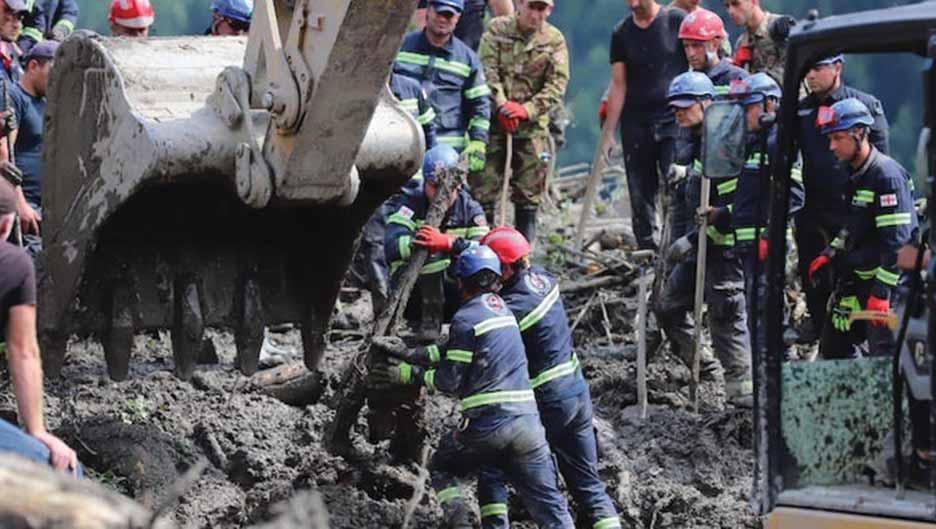
The Ministry of Internal Affairs of Georgia launched an investigation into the catastrophe, invoking two articles of the Criminal Code: "loss of life by negligence" (Article 116) and "violation of safety rules during mining, construction, or other work" (Article 240). However, the complexity of the situation has raised the possibility of these charges being reclassified as more information surfaces.
As the rescue operations unfolded, a preliminary report by the National Environment Agency shed light on the causes of the disaster. The tragedy was attributed to a confluence of natural geological and hydrometeorological events that coalesced to form an extreme mudflow within the Bubusqli river valley. This unfortunate sequence of events was exacerbated by climatic changes, particularly, a surge in air temperature that accelerated the melting of glaciers, accompanied by atmospheric precipitation.
Contrary to assumptions, the report highlighted that the disaster's timing was near-impossible to predict on a global scale, given the intricate factors at play. The report outlined how a rocky mass collapsed to the west of the Buba glacier, triggering a chain reaction that caused a section of the glacier to crumble. This, in turn, led to the overflow of subglacial waters, unleashing a powerful wash that coursed through the valley with terrifying speed.
Russia Announces Bridge Construction Project Linking Kherson to Sukhumi
BY MARIAM GORKHELASHVILI
In the 15th year following the August war, Russia made an announcement concerning the construction of a road bridge that will link Kherson to Sukhumi, Abkhazian media outlets report.
According to information from the Federal Highway Agency of the Russian Federation, representatives from the governments of occupied Abkhazia and Russia have engaged in discussions regarding a draft intergovernmental
agreement. This agreement pertains to the process of reconstructing, overhauling, and maintaining a bridge spanning the Psou River.
The proposed document outlines plans for both the reconstruction of an existing road bridge and the construction of a new E97 road bridge on the route connecting Kherson, Dzhankoy, Novorossiysk, Sochi, and Sukhumi. Upon the completion of these undertakings, ownership of both structures will be transferred to Russia. Currently, negotiations are underway to finalize the agreement text and determine its duration of validity.
One local resident recalled, "Three years ago, we said a landslide would come down in that valley and flood it, but no one listened." The call for better monitoring and early warning systems resounded as the disaster illustrated the limitations of predictive capabilities. Amid the devastation, international universities and nations expressed their
"We are now uploading satellite images taken by Landsat on July 27th and August 4th,” seismologist Tea Godoladze wrote on social media. “Landsat captured these images at a time when it was cloudy, and so the resolution is low. However, it is likely that approximately 7 km from Shovi, the bed of the Buba river widened dramatically, that is, a landslide-flood process began, which may have caused the river to become blocked (locals said the river was no longer flowing). This is exactly where monitoring and an early warning system could have helped! If we had online, instant access to these notifications, we would have been able to sound an alarm! If we had a suitable lidar, which all prestigious universities in Europe have, we would have been able to fly over it, clarify the data, and sound the alarm. These free Landsat images are uploaded too late - we need instant imaging!” she noted, adding a request to partner American and European universities to provide Georgia with paid satellite images of this period. “Maybe they were taken at a different time than Land-
The catastrophe's aftermath witnessed a remarkable display of resilience as the Department of Highways embarked on a week-long commitment to relief and recovery efforts. Minister of Regional Development and Infrastructure, Irakli Karseladze, led the charge, overseeing operations and ensuring an efficient allocation of resources.
In a bid to expedite recovery, the focus extended beyond rescue operations to the restoration of damaged infrastructure. A notable highlight was the initiation of the construction of a new temporary Sarmi bridge over the Chanchakhi river, covering a span of 136 km along the Kutaisi (Choma)-Alpana-Mamison Pass highway. The collaborative synergy among governmental entities, emergency services, and the Department of Highways proved crucial in orchestrating seamless relief and rehabilitation activities.

The tragedy of Shovi, Georgia, resonates as a poignant reminder of nature's unpredictability and humanity's capacity to unite in times of crisis. As the village rebuilds and endeavors to implement preventative measures, the global response underscores the power of solidarity in the face of adversity.
Indigo Airlines and TAV Georgia Launch Direct Flights between Georgia and India
 BY MARIAM GORKHELASHVILI
BY MARIAM GORKHELASHVILI
The launch of direct air traffic between the capitals of Georgia and India marks a significant milestone in the connectivity between the two countries. Indigo, India’s largest airline, has started operating flights between Delhi and Tbilisi. The inaugural flight carried 186 passengers from Tbilisi to Delhi.
The event at Tbilisi International Airport, attended by various officials including representatives from TAV Georgia, the Director of Georgian Airports Union, the Head of National Tourism Administration, the Civil Aviation Agency, and Indigo airline representatives, under-
scores the importance of this new air route. Indigo will be conducting regular flights between the capitals of Georgia and India three times a week. With its extensive network and numerous aircraft, Indigo is well-equipped to facilitate this air link.
“TAV Georgia,” a subsidiary of TAV Airports Holding, has played a crucial role in the development of aviation infra-
structure in Georgia since 2005. Their investments, including the construction of new passenger terminals at Tbilisi and Batumi international airports, have contributed to the enhancement of airport facilities. The investment also covered the rehabilitation of the existing runway and the construction of a new flight terminal at Tbilisi International Airport.
Thanks to the considerable investments by TAV Airports Holding and their extensive experience in airport operations, “TAV Georgia” is recognized as a reliable and dynamic company in Georgia’s aviation sector.
With this new direct air route and the collaboration between Indigo and TAV Georgia, more opportunities for tourism, trade, and cultural exchange will likely open up between the two countries.
GEORGIA TODAY AUGUST 11 - 17, 2023 2 NEWS
Photo source: Commersant
Photo source: Agenda.ge
Another Landslide in Western Georgia – Officials Say Risk of a Repeat Tragedy Are “Minimal”
“According to specialists, the level of danger is low at the moment,” the information says.
CAUSES OF THE SHOVI LANDSLIDE
The cause of the devastating landslide in Shovi was the coincidence of several geological and hydrometeorological events, according to the first conclusion of the National Environment Agency.
Alandslide occurred in the municipality of Tsalenjikha, adjacent to the administrative unit of Muzhava, but the River Tebene was dammed and the danger level is low, says the website of the administration of the governor of Samegrelo-Zemo Svaneti.
The locals living in the villages located down the mountains where the landslide occurred are panicked and are asking the local authorities for help and a quick
response.
The landslide in Tsalenjikha was detected on August 8, just 5 days after the Shovi tragedy in which 21 people have so far been confirmed dead, and during which the bridges and the entrance road to Shovi were destroyed.
The governor’s administration says geologists and hydrologists have studied Tsalenjikha’s collapsed river bed and, based on the current situation at the dam, an official report will be prepared.
The Agency says that in the Bubastskali River valley (the right tributary of the Chanchakhi River), the intense melting of the Buba and Tbilisa glaciers and the subsequent precipitation set the solid sediments in the valley in motion, while also developing active lateral erosion processes; the river banks were scourged. This facilitated the formation and activation of the so-called coastal landslide processes, which later turned into mudslides.
The Agency said that the geological bulletin it issued in 2022 is about the river Dzghivora, which is a left tributary of the Chanchakhi River, where the mudslide torrents often pass, not the river Bubatskali that caused the August 3 mudslide.

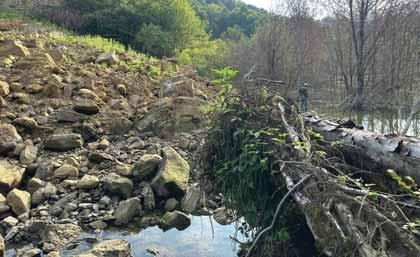
The Agency notes that as a result of the information processed by the geolo-

gists of the National Environment Agency, it is known that the flood developed on Bubistskali (the right tributary of Chanchakha) had not caused large-scale geological processes in the past and that such disasters were never observed in Shovi, as opposed to the left tributary river of Dzghviora (tributary of riv. Chanchakhi), where the activity of flood processes is frequent.
The Agency also pointed to the conclusions of the 2021 annual geological bulletin, which gained some publicity on Wednesday for a warning it contained
that “the mudslide poses a danger to the central highway and the infrastructure of the Shovi resort” and identified the threat as “high”.
The Agency’s statement Thursday also contradicts the reports and testimonies of Shovi locals who, in recent years, have repeatedly appealed to the local and central government to strengthen the banks of the Bubistskali river and to pay attention to the environmental situation in the valley, as they have frequently had to deal with the consequences of smallscale landslides and mudslides.
15 Years On, Georgia’s Scars of War Refuse to Heal, But Who’s at Fault?
Continued from page 1
During his statements to the press at the cemetery, Garibashvili commented on the beginning of the war, stating “you can read the order of the president of that time, where it is directly written ‘August 8’ - until 2012, August 8 was officially celebrated as the date of the start of the war.” In response, members of several opposition parties latched on this, calling it a falsehood and a line from the Kremlin. "Russia attacked us on August 7, this is already a fact recognized by the world,” Giorgi Vashadze, MP and chairman of the Strategy Aghmashenebeli party, said to the media.
At the center of the debate is who was the true aggressor in the war. The Kremlin’s narrative has long been that Georgia had been attempting to subjugate these two regions by force, including genocide, and this began with the shelling of Tskhinvali on August 8. Fueled by Rusophobic sentiments in the West and their manipulation of the Georgian government, the Russian side states that Georgia was at fault for the destruction that came after their forces were forced to intervene in a “peace enforcement” operation as a result of this attack on the South Ossetian de facto capital.
Conversely, the Georgian and Western side says quite simply that Russia used the internal security issues in Georgia as a causus belli. With Tbilisi growing closer and closer to Europe and the collective West, the Kremlin saw the opportunity to cripple the trend, thus virtually eliminating the possibility of a NATO country on its southern front. This side states that Russian troops had already entered Georgian territory on August 7th, ahead of any Georgian operations around Tskhinvali, in order to invade and capture territory, not to “enforce peace”.
To drive this home, Giga Bokeria, head of the European Georgia party, noted, “This was a key issue of our enemy's propaganda, to at least partially blame Georgia for what happened in August 2008 and the fact that today we have a government, a regime, which in this mat-
ter and more in the wider context, has completely become a part of our enemy's propaganda and has become a partner in this. Russia sees in this a recipe for maintaining power for itself; this is our shame.”
With most opposing arguments, the truth generally lies in the center somewhere. However, taking a deeper look at the events of those harrowing days as the dark clouds in the north gathered allows one to see the intricate details that shed more light on the reality on the ground. With the fog of war working against the truth, it is imperative to take several key notes into account.
The first step is to look at the background of the war. For months, and indeed even years, Tbilisi had sparred with militants in both regions. Groups in South Ossetia and Abkhazia had long sought their own independence after the fall of the Soviet Union, when the duo had achieved some small modicum of autonomy as oblasts, or regions. Following the Georgian civil war, tempers had not cooled and low-level conflict continued to be seen.

In the weeks prior to August 7th and 8th, these tensions had resulted in sporadic gunfights and artillery exchanges.
On August 1, Georgian police were struck by an improvised explosive device planted by South Ossetian militants, causing Georgian troops to open fire, killing at least 4 of the armed militants. For days after, the frequency of armed clashes steadily rose. On the 6th of August, thenPresident Mikheil Saakashvili attempted to reach then-President of Russia Dimitri Medvedev in order to sway him against an intervention or invasion, but he was unable to reach the Kremlin and was told that “the time for presidential negotiations has not yet arrived.”
In this crescendo of violence, Russian military forces were confirmed to have been moving around the North Caucasus, well within Russian territory. However, a Georgian intelligence report at the time claimed that intercepted communications indicated that Russian units entered Georgian territory in the latter part of the 7th. A call between a South Ossetian border security command post
and a smaller post by the Roki Tunnel connecting Russia with Georgia was reportedly recorded at 3:52 AM on August 7th.
“Listen, has the armor arrived or what?” the command post asks. “The armor and people,” the response came. When asked if these Russian units had already passed through the tunnel, the reply was “Yes, 20 minutes ago; when I called you, they had already arrived.” The messages confirm that Russian military units were on the move long before any Georgian offensive operations.
What the calls do not tell us is how many units passed through the tunnel.
The Russian Ministry of Defense has held the position that any movement was a small contingent meant to rotate peacekeeping units out of the area, indeed units that had been working with Georgian units in a long-established deal. However, the Estonian National Defense College released a report indicating that the size of the units was far more than any peacekeeping agreement allowed for. “150 Russian tanks and armored personnel carriers entered the Roki tunnel
in the morning hours of August 7,” the report says. “This happened 20 hours before President Saakashvili gave the order to attack.”
Additionally, a 2009 Black Sea Trust report commented on the composition and mission of such a force, stating the objective was a “full scale invasion inside the Georgian territory with the direct objective to replace President Saakashvili and his regime and to install a ‘more responsible’ president in Tbilisi, as Russian authorities clearly put it.”
Interestingly, another report from the Russian side that went largely under reported shows that Russian conscript units were deployed on August 7th as well. Days after the war concluded, the Russian newspaper "Permskiye Novosti" published an article titled "Perm soldiers found themselves in the epicenter of the war." In this article, the unit of conscripts spoke with family members about the state of confusion many of them found themselves in during the conflict. The article quotes one of the conscripts who called home saying to his family that "we have been here since August 7. Well, our
entire 58th army” and adding that he was not able to call sooner as the unit’s command had “silenced” their phone service.
In an interview, Russian Captain Denis Sedristyi said to military news outlet Krasnaya Zvezda that “on August 7th, we received the order to start moving towards Tskhinvali. An alert was declared and we began the road march.” Thus, with this compiled information, it can be assessed that indeed Russian regular units had been in Georgian territory, moving in an offensive and tactical nature before any Georgian movements against them had begun in earnest.
Sadly, the resulting 5 days of combat saw 180 Georgian soldiers and police killed, and more than 1,000 wounded. Russia sustained 170 killed and more than 350 wounded, including members of the North Caucasian, Cossack, Abkhazian, and South Ossetian militias. The controversy, still leaving the wounds of war open, is only deepening the divide between people once united. Indeed, in light of more recent events since 2014 in Ukraine, it is more clear than ever which side is the true aggressor in the region.
GEORGIA TODAY AUGUST 11 - 17, 2023 3 POLITICS
Georgian National Guardsmen during the Russian invasion of Georgia, 2008.
Photo source: Press Office of the Government Administration
Ukraine Latest: Explosion at Military Supply Plant near Moscow Injures 45; UN Condemns Strikes on Pokrovsk
COMPILED BY ANA DUMBADZE
An explosion at an opticalmechanical plant near Moscow injured at least 45 people, Reuters reported Wednesday, citing local officials.
The factory manufactures night vision equipment and binoculars for the Russian military and is part of Russian defense conglomerate Rostec. Russian emergency services blamed the explosion on “workflow violations” and rejected reports of a drone strike.
Separately, two drones were shot down upon approaching Moscow overnight, Russian officials said, in the latest of a growing number of interceptions by the Russian capital’s air defense systems. There was no damage or injuries, the Russian Ministry of Defense said.
In his nightly address on Tuesday, Zelensky said that the death toll from Russia’s Monday strikes on Pokrovsk in eastern Donetsk had risen to nine, with another 82 people injured. A missile reportedly destroyed a popular hotel near the front line.
Denise Brown, the United Nations’ humanitarian coordinator for Ukraine, said she was “profoundly disturbed” by the “horrifying attack” on Pokrovsk, which she estimated hit residential buildings, “killing and injuring scores of civilians.” Brown said missiles struck the same location twice, meaning that frontline workers were hit.
UKRAINE CONFIRMS
CRIMEA BRIDGE HIT
The Ukrainian armed forces on Sunday confirmed that they had hit the Chonhar and Henichesk bridges leading to Crimea, a region of the country which Russia illegally annexed in 2014.
"At around 15.00, the defense forces struck the Chonhar and Henichesk bridges, which are important communication routes of the invaders," the armed forces said in a statement on Sunday.
Earlier, Russia said that Ukraine fired missiles at the Chonhar bridge that connects the Kherson region to the Crimean Peninsula.
“Kyiv terrorists fired NATO Storm Shadow missiles at the Chonhar bridge and the village of Chonhar. The bridge was damaged by a rocket,” Vladimir Saldo, the Russian-installed head of Ukraine’s Kherson region, said in a statement on Telegram.
In a separate statement, Sergey Aksyonov, the Russian-installed head of Crimea, said on Telegram that some missiles were shot down by air defense systems and that there were no casualties.
WHITE HOUSE EXPECTS CONTINUED SUPPORT FROM BIPARTISAN LAWMAKERS ON NEXT UKRAINE FUNDING REQUEST
The White House said it has seen “solid support from the American people” when it comes to financing Ukraine’s fight against the full-scale Russian invasion.
“We have seen throughout this war solid support from the American people, solid support from the Congress in a bipartisan and bicameral way for continuing to support Ukraine. And we are going to stay focused on that,” National Security Council spokesman John Kirby told reporters on a conference call.
The Biden administration is expected to submit its next financial request to Congress soon. The Pentagon said on Tuesday that the US has approximately $6 billion in congressionally approved funds.
“The President will continue to make the case that the greater national secu-
rity obligations are at play here, including our national security and the national security commitments that we have made through the NATO alliance,” Kirby added.
‘WE’RE HOPEFUL:’ U.S. SAYS OF RUSSIA RETURNING TO BLACK SEA GRAIN DEAL
US Ambassador to the United Nations Linda Thomas-Greenfield said the Biden administration is hopeful that Russia will return to the Black Sea Grain Initiative.
The deal, which Moscow abandoned nearly a month ago, reopened three Ukrainian ports amid Russia’s naval blockade for agricultural exports. The agreement allowed for more than 1,000 ships carrying nearly 33 million metric tons of agricultural products to more than 40 global destinations.
“We’re hopeful. The Secretary-General has not given up. The Government of Türkiye is working along with him to urge the Russians to come back into the deal, and we support those efforts,” Thomas-Greenfield said in an interview with Carolyn Beeler of PRX’s The World.
“Hopefully, through the efforts of the Secretary-General, they will eventually come to the right decision,” she added.
US TREASURY IMPOSES ADDITIONAL SANCTIONS ON BELARUSIAN REGIME FOR PUTIN’S WAR IN UKRAINE
The Biden administration imposed sanctions on eight Belarusian citizens, five entities, and identified an aircraft as blocked property, according to an announcement by the Treasury Department.
“In line with our partners and allies, we will continue to ensure that the regime pays a price for its abysmal treatment of its own citizens and that our measures in response to Russia’s aggression cannot be circumvented through Belarus,”
wrote Brian Nelson, undersecretary of Treasury’s Terrorism and Financial Intelligence unit, in a statement.
AT LEAST 35 INJURED IN EXPLOSION AT FACTORY NEAR MOSCOW, RUSSIAN MEDIA REPORTS
At least 35 people were injured after an explosion at an optical-mechanical plant near Moscow, Russian media reported. The facility manufactures night vision equipment and binoculars for the Russian military and is part of Rostec, a large Russian defense conglomerate.
The explosion at the Zagorsk plant in the town of Sergiyev Posad prompted a total evacuation from nearby buildings and caused “damage to social facilities,” with emergency services working at the scene, according to state media agency Tass.
“There are a lot of buildings that had windows blown out,” Sergiyev Posad’s administration wrote on its Telegram channel, according to a Google translation.
Russian emergency services are blaming the explosion on “workflow violations” and rejecting reports of a possible drone strike, state media outlet RIA Novosti said.
Videos posted to social media on both Russian and Ukrainian Telegram and Twitter accounts show a massive mushroom cloud emanating from the factory with plumes rising high into the sky.
Ukrainian officials have already cast doubt on Russia’s claim that the explosion was caused internally.
RUSSIA TO STRENGTHEN FORCES ON WESTERN BORDER, DEFENSE MINISTER SAYS Russia will aim to build up its forces on its western border, Defense Minister Sergei Shoigu told a military meeting Wednesday, according to a transcript
posted by the department.
“The United States is steadily raising the stakes, seeking from its allies deliveries of increasingly long-range and deadly weapons. In May, British longrange Storm Shadow air-launched guided missiles were transferred to Ukraine,” Shoigu said.
“Threats to the military security of the Russian Federation have multiplied in the western and north-western strategic directions.”
Shoigu said there was a “serious destabilizing factor” from the accession of Finland and planned accession of Sweden to NATO, as well as an existing risk from the “militarization of Poland.”
UK ANNOUNCES NEW RUSSIA SANCTIONS TARGETING ACCESS TO MILITARY EQUIPMENT
Britain’s foreign office on Tuesday announced 25 new Russia-related sanctions that the UK said represent the “biggest ever UK action on military suppliers in third countries.”
The sanctions apply to individuals and business based in Turkey, Dubai, Slovakia and Switzerland, which the UK says are supporting the invasion of Ukraine by providing Russia with access to electronics used in military equipment.
The UK also extended sanctions on several Belarusian defense organizations.
“The Russian defense industry is severely stretched and focused entirely on sustaining the war. Unable to access Western components, the Russian military is struggling to produce sufficient top-end equipment and is now desperately searching for foreign armaments,” the foreign office said.
“Today’s package tackles Russia’s attempts to circumvent and offset these clear impacts of UK and allies’ sanctions.”
MFA of Russia: Western Countries are Clearly Exerting Pressure on Georgia
Saakashvili: The 2008 War Could’ve Been Avoided, if We had Remained a Backward, Corrupt Country
According to the former president of Georgia, Mikheil Saakashvili, the August 2008 war could have been avoided if Georgia had “remained a criminal, corrupt country to which Russia would do whatever it wanted at any time.”
According to Saakashvili, the President of Russia, Vladimir Putin, directly asked him to appoint their agents as the heads of the security forces.
“My answer to Ivanishvili’s talking heads! Could the war of 2008 have been avoided? Yes, it was possible. All we had to do was this:

1. Leave Aslan in Adjara and refuse to develop Batumi;
2. Appoint [Russian] agents as the heads of the security forces, as Putin directly requested;
3. Not have fought against corruption,
because the Russian influence in Georgia was mainly based on this;
4. Not have carried out any reforms, since Russia considers reforms as dangerous precedents;
5. Not have moved towards the European Union and NATO;
6. Not have refused the Russian schemes in energy and, accordingly, should have left Georgia in the dark;
7. We should not have created the Georgian army and military production.
“In one word, we had to remain as a backward, devastated, corrupt country whose fate no-one in the world would be interested in, and to which Russia would do whatever it wanted at any time,” Saakashvili wrote on Facebook.
15 years have been passed since the August war when Russia invaded Georgia. As a result, 20% of the country’s territory remains occupied by Russia.
The Western countries are clearly putting pressure on Georgia, on the issue of dialogue with Russia, Denis Gonchar, Head of the Russian Foreign Ministry’s Fourth CIS Department, said in an interview with the Russian media.
“Western countries are clearly exerting pressure on Tbilisi, despite the fact that neither air transport nor other components of the trade-economic relations
between Russia and Georgia violate the existing sanctions regime,” Gonchar noted.
According to him, Russia evaluates the attempt to extraterritorially apply the “illegitimate” sanctions imposed against it as interference in the internal affairs of sovereign states.
“We consider the attempts of extraterritorial application of illegitimate antiRussian sanctions as interference in the internal affairs of sovereign states and their relations with third countries,” said
the representative of the Russian Foreign Ministry.
According to him, the Russian leadership made a decision to restore direct flights with Georgia and to introduce a visa-free regime for citizens of this country “based on the need to promote contacts between the Georgian and Russian peoples, humanitarian and economic ties between Moscow and Tbilisi” and that Moscow will continue to be guided by these considerations.
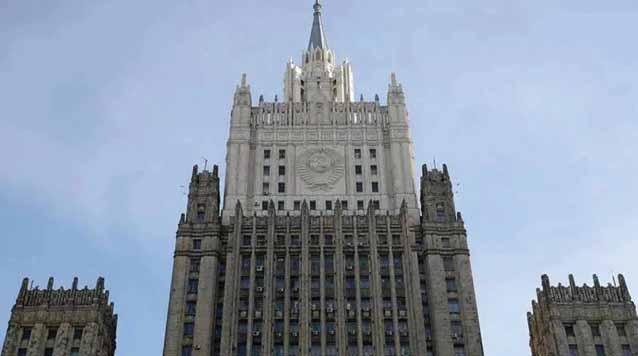
GEORGIA TODAY AUGUST 11 - 17, 2023 4 POLITICS
Award-Winning Writer Jonathan Littell on 2008, Sarkozy, Misha, and the Russian Apathy
 INTERVIEW BY VAZHA TAVBERIDZE
INTERVIEW BY VAZHA TAVBERIDZE
This week, Radio Free Europe’s Georgian service sat down with Jonathan Littell, who was in Georgia in 2008 writing for Le Monde. He now lives in Barcelona, having grown up in France and the United States. His first novel, written in French, The Kindly Ones, won two major French awards, including the Prix Goncourt and the Prix de l'Académie française. We started by asking about his memories of the 2008 war.
15 YEARS ON, WHEN YOU THINK OF THIS WAR, WHAT'S THE FIRST THING THAT POPS INTO YOUR MIND?
Russian troops occupying Gori is an enduring image. Russian checkpoints on the main highway between Tbilisi and Gori. The destruction in the villages between Gori and South Ossetia, which we visited with other correspondents. But mostly, I would say, the sheer shock of the Georgian population that this could be happening, that suddenly their country was caught in an actual war with their giant neighbor. I think that was extremely terrifying to most people.
DO YOU THINK THERE WERE ANY LESSONS FOR THE WEST TO LEARN FROM THE 2008 WAR?
Yes, very clearly: they should have resisted Russian aggression much more strongly than they did. I think Sarkozy's role in appeasing the situation and basically giving the Russians everything they wanted was absolutely shameful. His decision to sell them warships immediately after the conflict was even more shameful, sending Russia completely the wrong signal that basically this would be tolerated, they could do anything they wanted in their backyard without anyone really caring much about it. You know, we completely misread… there was this whole myth that Medvedev was going to be more liberal and more open and a more democratic President Putin. And obviously, the West completely misread the dynamics between the two and who was pulling the strings, who was actually controlling things. So yeah, there were major mistakes. I mean, from Bucharest on, the West made nothing but mistakes in its dealings with Russia, leading to the current situation. If they were going to open the door to Ukraine and Georgia in 2007, they should have just let them into NATO immediately, but as we know, while the Americans wanted to do it, Germany and France didn't. And that's what led to the stalemate, which then led to the Georgian war, which further down the line led to the 2014 Ukraine events and the current full scale invasion.
IF THERE'S ONE SILVER LINING ABOUT BITTER LESSONS, IT'S THAT ONE CAN LEARN
FROM THEM. DID THE WEST LEARN ANYTHING FROM 2008?
No, I don't think so. They didn't even really learn from 2014. It's only in 2022 that they woke up and went, “Oh my God, what's happening?” All those years between 2008 and 2022, the British let Russian oligarchs run rampant in London, washing all their dirty money in British football clubs, in British real estate, while Putin was killing opponents on British territory; the Germans were
feeding off the gas and oil siphon, cheap gas and oil from Russia to boost their economy, without caring about the geopolitical risks. So nobody learned anything at all, no-one really seemed to care, seemed to understand Russia.
WAS IT IGNORANCE OR UNWILLINGNESS TO LEARN?
On the part of Angela Merkel, who grew up in communist East Germany, I don't think she can plead ignorance. She understands the Russians perfectly - it's built into her genetic makeup to understand what these people are and what they're capable of, because she grew up under their boots. She knows them very well. But she somehow managed to convince herself that through this whole normalization, through a commerce strategy, by entangling them in commercial networks with the West, it would make any sort of aggression impossible. And obviously, that was a complete miscalculation.
The French never understood the Russians. I spoke back in 2006 with a then senior French official, who's now a very important minister in the French government, about my experiences, and I was trying to explain to him how dangerous Putin was for everybody’s security, not just for people inside his country. And he basically laughed me away and said, “No, no, I've met Putin three times. He's very reasonable. He's someone you can do business with. He's predictable. We're not going to have any problems.” We spoke again last year, and he was like, “yep, Jonathan, you were right, I'm afraid I have to recognize that.” But it took 16 years for that realization.
In France, there is a traditional Russophilia which goes way, way back, reinforced by De Gaul’s semi non-alignment position during the Cold War. So a large part of the French establishment is actually incredibly Russophile, which makes it very difficult for them to objectively assess the actual threats posed by Russia. And Macron finally came around, it took him a year after the start of the full scale invasion, but even he was completely caught up in the old myths that “we can talk with them, we can calm things down through dialogue.”
It's a complete misunderstanding of the nature of the system itself, which is very similar to the current Georgian system. It's a completely corrupt mafia running the country, and doing so in its own interests that have nothing to do with the objective interests of the state, the objective interests of the people of Russia. When Putin talks about Russia and what Russia needs and Russia's interests, he's talking about the interests of his clique, of his very small circle of incredibly wealthy friends that have stolen most of the wealth in the country, just like Georgia’s current government, and the man behind its functioning: not in the best interests of Georgia and its population, but in their own interests.
WE MENTIONED SARKOZY, AND IT WOULD BE A GLARING HOLE IF WE DIDN’T MENTION THEN GEORGIAN PRESIDENT SAAKASHVILI AND HIS ROLE, AS, TOGETHER WITH PUTIN, THEY WERE THE TRIAD OF LARGER-THAN-LIFE FIGURES IN THE 2008 WAR. HOW HAS HISTORY TREATED THEM?
Well, Sarkozy’s story is definitely not finished. He is now under criminal investigation for all sorts of reasons: corruption, the whole Lybia affair, etc. So, we have to reserve judgment for Sarkozy
until his trial finishes, but he’s certainly going down in a very disgraceful way for a former President. Misha Saakashvili is obviously a very complex figure. There was good and bad in him from the very start; his methods, when he was in power, were incredibly rough, and he made quite a lot of important mistakes with his people, but he also did amazingly well in modernizing the country, dragging it forward into the 21st century, in liberalizing the political system, which I see now is being reversed by the current regime. Saakashvili’s latest gamble, coming back to Georgia, hoping it would shake things up like it did in 2003, is very typical of him - it’s gambling, and gambling isn’t a character trait which is valued in politicians. Politicians who gamble are considered dangerous people. And, unfortunately for Mr. Saakashvili, his latest gamble is paying off very, very badly. It’s quite possible that he will die in jail, and that will be the end of his story, which is a shame, because he is a man of immense energy, talent and promise, and I think he could have done more great things for Georgia if he had made his decisions more strategically, in a more thought-out way. But that’s not his style, so… We hope that the Georgian government will finally succumb to international pressure and release him and send him to Ukraine for treatment. If he dies in jail, it will be an incredible black mark for this government, and might actually lead to its downfall. I definitely hope that Georgia will be restored to its democratic path, instead of the Russian one that they are following now under Ivanishvili.
YOU SAY IT TOOK A YEAR FOR MACRON TO COME TO HIS SENSES, YET HE STILL INSISTS THAT RUSSIA SHOULD NOT BE HUMILIATED. WHAT’S YOUR TAKE ON THAT?
Clearly, a lot of the western leaders seem to think it's better for the West to be humiliated than for Russia to be humiliated. It's stupid reasoning. I mean, the only ones I think are fairly clear-headed right now are the Americans. They've understood very clearly that they wrongly hoped they could ignore Russia, leave Russia to Europe so they could concentrate on China. That was the whole hope under Obama, that Russia was a regional power and no longer a world power, and
that they could basically ignore it. In February 2022, the fact was thrown into their faces that no, they could no longer ignore Russia; they had to deal with the threat. And I think they're dealing with it incredibly effectively, in the way they're leveraging their aid to Ukraine, both military and financial, to weaken Russia. Their whole strategy is designed to pull the teeth from Russia, to make it as little a threat as possible, while never ignoring the fact that they have nuclear weapons and we don't want to push them over the edge to the point where they might use them. Because of all the commercial connections, I think Europe is a lot more confused. This whole Macron line about not wanting to humiliate Russia is something I've denounced in the past year, quite openly, in the French press. I think it's a complete mistake. I think, on the contrary, Russia has to be defeated decisively once and for all on the battlefield, kicked out militarily from Ukraine. Hopefully, that would provoke the collapse of this insane fascist regime. And then Russia could start reconstructing itself within a slightly more normal country that can live with its neighbors in a normal way. Really, the only hope for the future is complete defeat. Obviously, yes, that will be humiliating for Russia. But as I also wrote, Russia is so good at humiliating itself, it doesn't really need anybody from the outside to do the job for them – [they have] the most incompetent, the most incapable manner that one could possibly imagine. I mean, not in recent military history nor the past two centuries have I heard of such a botched invasion on a simple military level. This badly conducted, this badly planned, this badly prepared. I mean, Americans have done horrible and criminal things in their wars in the past 20 years, but when they invade a country, they do it well- they have a doctrine, and they apply it. The Russians aren't capable of properly invading anybody.
WITHOUT A COMPLETE DEFEAT ON THE BATTLEFIELD, WILL RUSSIANS START TO CHANGE THINGS THEMSELVES AND STAND UP TO PUTIN?
Nothing is going to change politically in Russia until Russia is defeated in Ukraine: the system is far too strong. The Prigozhin episode showed major weaknesses within the system, but the system survived that episode quite well. And, as humiliating
as it might be for Putin to have let Prigozhin go safely and to let him continue about his business, it shows a sort of capacity for adaptation in the system, and sort of realism as to its internal functioning, which means it's unstable, but strong in its instability.
Nothing can come from inside Russia, but if they are defeated on the battlefield, if there is a major military collapse, as has been the case throughout Russian history- Nikolai the first didn't survive, saw defeat in Crimea, Nikolai II barely survived defeat in Japan and did not survive for long, the Soviet Union did not survive defeat in Afghanistan. It is a constant in Russian history that military defeat precipitates the fall of the leader of the regime. And I'm convinced it will be the same thing in this case.
IN YOUR RECENT PIECE, YOU CALLED ON YOUR RUSSIAN FRIENDS AND COLLEAGUES TO ACT, REMINDING THEM THAT “FOR YEARS AFTER [THE 2008 WAR], HOW MANY OF YOU DID I RUN INTO ON THE SKI SLOPES OF GUDAURI, HIKING AROUND KAZBEGI, OR ENJOYING THE CAFÉS AND STEAM BATHS OF TBILISI WHILE YOUR ARMY OCCUPIED PART OF THE COUNTRY?”
This is something that seems deeply anchored within the Russian character. There are some amazing activists in Russia, but most of them now are either jailed or dead, and the bulk of the liberal inteligencia has been incredibly apathetic since the fall of the Soviet Union. As I pointed out in the piece you are quoting, even during the Chechen war, most of the people I was partying with didn’t want to know anything about Chechnya, like it wasn’t their problem. Georgia, which is not even inside their country, was even less of a problem. And we can see very well that when Ukraine started bombing certain things in Crimea, there were people who were on vacation in the warzone who suddenly realized “oh, it’s not good for my family, we must evacuate.” It is this capacity of disassociation and detachment in the Russian mentality, that if it doesn’t affect you or your family personally, it doesn’t exist. Which is why mobilization proved to be such a dodgy business for Putin, because it affects people directly, and he doesn’t want that: he wants them to remain apathetic.
GEORGIA TODAY AUGUST 11 - 17, 2023 5 POLITICS
Jonathan Littell. Source: RFE
Possibility of HighSpeed Passenger Train on Baku-Tbilisi-Ankara Route Discussed
 BY MARIAM GORKHELASHVILI
BY MARIAM GORKHELASHVILI
Apotential introduction of a high-speed passenger train along the Baku-TbilisiAnkara route has been discussed.
Azer Farajov, the executive head of the passenger transport department at “Azerbaijan Railway,” shared insights about
this in an interview with APA.
As per Farajov, the train could consist of passenger sleeping cars provided by Stadler Rail Group.
“In line with our post-pandemic measures, which involve the reopening of cross-border travel, the idea of operating a high-speed passenger train on the BakuTbilisi-Ankara route is being explored. This train would comprise passenger sleeping cars manufactured by Stadler Rail Group,” – explained Azer Farajov.
Upcoming Helicopter Hangar & Rescue Office Project Near Tbilisi Airport
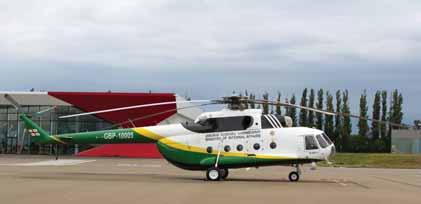 BY MARIAM GORKHELASHVILI
BY MARIAM GORKHELASHVILI
Anew project is on the horizon, involving the establishment of a helicopter hangar and a search-andrescue office within the vicinity of the Aeronautical Administration near Tbilisi Airport. The project, outlined in a tender valued at $22.5 million, is set to encompass both the renovation of existing structures and the construction of novel facilities.
The venture is slated to include the development of a structure for the auto farm situated within the con fi nes of “Georgian Air Navigation” LLC’s territory. Furthermore, the scope of work entails erecting the helicopter hangar and search-and-rescue offi ce on the premises of “Georgian Air Navigation” LLC. However, the precise function of these forthcoming buildings remains undisclosed in the tender’s offi cial documentation. Consequently, it remains uncertain whether these facilities will accommodate the upcoming rescue helicopter procured
by the state from Airbus, for 26 million euros.
Prospective participants vying for the project must possess a proven track record of having completed construction endeavors valued at a minimum of 15 million GEL to be eligible to partake in the competition.
The application process for the tender is scheduled to kick off on September 6, with the submission period drawing to a close on September 11. This narrow timeframe presents interested parties with the opportunity to submit their proposals for evaluation.
Gino Paradise: An Unforgettable Aquatic Adventure in the Heart of Tbilisi
BY MARIAM GORKHELASHVILI
Imagine a place where thrilling water slides, relaxing pools, and rejuvenating spa facilities come together to create the ultimate holiday experience. Gino Paradise, located in Tbilisi, Georgia, is that very place, offering visitors an unparalleled escape from the daily grind. In an exclusive interview with Kate Machavariani, we uncovered the secrets behind what sets Gino Paradise apart from other water parks and why it is a must-visit destination for tourists and families alike.
Gino Paradise prides itself on providing a wide array of activities and attractions, ensuring there’s something for everyone. With up to 10 different types of pools and slides catering to various age groups, from daredevils to the more leisurely inclined, guests are promised an unforgettable adventure.
“Unforgettable adventures always await the guests of Gino Paradise. Here you will find up to 10 different types of pools, the largest toboggan in Eastern Europe, slides for different ages and an entertainment program. Every day spent at Gino’s is special and memorable.” – Kete Machavariani said.

What truly sets Gino Paradise apart from other water parks in the region is the seamless integration of diverse offerings. While it boasts exhilarating waterbased fun, the park also offers a wellness and spa space, where visitors can indulge in relaxation rituals and rejuvenating treatments. Additionally, with up to 12 food outlets, guests can satisfy their
culinary desires with a variety of options.
“We can truly say that not only in Tbilisi and Georgia, but also in the entire Caucasus region, Gino has no competitor. In addition to the aquapark, we offer our customers a wellness and spa space, up to 12 food outlets. In addition, our 5-star hotel is already operating 200 meters from the aqua park. It really is
the recipe for a perfect vacation.”
But Gino Paradise doesn’t stop there. Ensuring that every moment is special and memorable, the park organizes themed evenings, raffles, master classes, and competitions. With animated characters frequently making appearances and live musical performances, the entertainment program caters to both young
and old, adding an extra layer of enjoyment to the overall experience.
One of the unique aspects of Gino Paradise is its focus on safety and security. Trained and professional staff ensure that guests are in safe hands throughout their visit. Water laboratories and nutritional monitoring further contribute to the park’s top priority: providing a secure
and enjoyable vacation for everyone. Looking towards the future, Gino Paradise has exciting plans in store. The park aims to enhance its offerings by adding sports fields, catering to sports enthusiasts seeking an active element to their aquatic adventures. Modernizing several pools will also enable the park to welcome more visitors during the winter months, making Gino Paradise a year-round destination. “Sports fields will be added to the park very soon. In addition, several pools are planned to be modernized so that more pools can be served to customers during the winter.” – says Kate Machavariani. By engaging with their customers and seeking feedback, Gino Paradise continuously strives to improve its services. A “book of impressions” allows visitors to leave their comments, and a thorough evaluation system helps the park understand and address the needs of its guests. Dedicated managers are always available to ensure that the Gino Paradise experience exceeds expectations.
So, what makes Gino Paradise a mustvisit destination? The answer is simple: it caters to everyone. With an abundance of recreational activities, wellness facilities, delicious dining options, and a focus on safety and comfort, Gino Paradise offers an unforgettable holiday experience without leaving the city.
Whether you’re seeking an adrenalinepumping adventure or a peaceful oasis, Gino Paradise has it all. It’s not just a water park; it’s an all-encompassing escape from reality. So, the next time you find yourself in Tbilisi or the Caucasus region, make sure to head to Gino Paradise for a magical and perfect vacation that you’ll cherish for years to come.
GEORGIA TODAY AUGUST 11 - 17, 2023 6 BUSINESS
Majid Al Futtaim Retail Launches Retail Graduate Program to Empower Next Generation of Carrefour Leaders

Majid Al Futtaim Retail, owner and operator of Carrefour in Georgia, announced the launch of its transformative Retail Graduate Program in collaboration with 12 top universities across six countries, namely Egypt, Georgia, Jordan, Kenya, Pakistan, and the United Arab Emirates. With a steadfast commitment to promoting gender diversity, Majid Al Futtaim Retail aims to empower and recruit 75 nationals for its regional Carrefour operations, targeting 50% of the positions for talented female candidates. This initiative not only strengthens Majid Al Futtaim Retail’s position as an investor in local talent development, but also actively contributes to and supports local communities and economies, and establishes lasting relationships with educational institutions.
Majid Al Futtaim Retail's partnerships with universities in Georgia include the Free University of Tbilisi and Caucasus University (CU). Through these strategic collaborations, Majid Al Futtaim Retail establishes a collaborative and dynamic platform that attracts top talent, facilitating the development of a qualified workforce. Selected candidates will undergo an
intensive 24-month on-the-job training, which includes rotations across in-store operations, e-commerce, and merchandise functions, among others. This holistic approach ensures a comprehensive learning experience and equips participants with a deep understanding of the diverse aspects of a modern retail industry. Upon successful completion of the program, graduates will be provided with the opportunity to secure full-time supervisory-level positions within Carrefour.
Commenting on the launch of the program, Jerome Akel, Carrefour Georgia Country Manager, stated: "The Retail Graduate Program represents our dedication to supporting the young generation in kickstarting their careers in the retail industry. By offering comprehensive on-the-job training and exposure to different facets of the business, we aim to fast-track the career progression of these graduates and build a strong leadership pipeline for the future of retail."
The involvement of the universities helps to organize job fairs and on-campus career events and sessions to raise awareness about the grocery retail business and its various functions, while also providing students with invaluable insights into the industry.
"At Majid Al Futtaim Retail, we believe in investing in young Georgian talent and providing them with the tools and resources they need to thrive. Our Retail Graduate Program is designed to foster the professional growth and development of these individuals, while also fulfilling our vision to generate positive social impact on our communities. This
program serves as a testament to our dedication to Georgia’s vision to support local talent, building on our efforts towards nurturing tomorrow’s retail leaders," Akel added. Interested candidates are invited to submit their applications before 31 August 2023 by visiting: https://careers.majidalfuttaim.com/go/Graduate-and-Intern-
ship-Programs/3197801/.The courses are available for nationals, and are scheduled to begin on 1 October 2023. This collaborative effort between Majid Al Futtaim Retail and Free University of Tbilisi and Caucasus University aims to connect academia and industry, fostering growth and innovation in the retail sector.
Unveiling the Secrets of Qvevri – A Culinary Journey in Tbilisi, Georgia
BY MARIAM TSADZIKIDZE
The idea of opening “Qvevri” comes from wine culture. The restaurant serves hundreds of people today, therefore “Qvevri” is in such a market that it should have its own wine.
Qvevri restaurant aims to export, and their main goal is to show people a real,
valuable sample of wine.
In the restaurant, you will find modern Georgian dishes which are completely different from the dishes of other restaurants. Qvevri restaurant has a new chef, and there are also foreign chefs here, which is well-reflected in the dishes.
Qvevri offers customers not only delicious food and a beautiful atmosphere, but they can also plan a desired event, for which all obligations, such as photography, decoration, and music, are


taken on by the restaurant. In all this, they are supported by a large and friendly staff.
As the name suggests, the focus is on the pitcher here, and the restaurant has its own sommelier. Qvevri is soon to begin testing its wine in a laboratory in order to be able to release its own wine brand.
The restaurant boasts VIP zones and a wonderful, cozy outdoor space.
The band “Iberia” sings to guests in
the restaurant, brightens up every evening. Here, you will meet a Georgianmodern style environment, saturated with old, cultural touches. All this can be felt in the dishes, as well as in the music.
Qvevri also has its own “Tone” oven, where you can attend a master class on making shoti bread. You will soon find new “Qvevri” restaurant branches in Batumi and Dubai, too.

GEORGIA TODAY AUGUST 11 - 17, 2023 7 BUSINESS
ibis Hotel Brands: Revolutionizing the Tourism Industry with Modern Economy Class


“Motivation is very important for coworkers. If the work of the team is not based on respect, then nothing will work. The Accor team takes care of its staff with various incentive programs. The friendly attitude among employees is maintained, and can be felt in the final result in their attitude towards guests," said
human in every situation. You must be patient, tolerant. Obviously, sometimes it's difficult, but at the end of the day, showing how to treat guests... that is what makes our team unite so strongly," noted Vitaly Voronov, General Manager of ibis Tbilisi Stadium.
BY MARIAM GORKHELASHVILI
The tourism industry has witnessed a remarkable transformation in recent years, and modern economy class hotels like ibis, ibis Budget and ibis Styles have played a pivotal role in reshaping the way travelers experience their journeys. With an emphasis on affordability, convenience, and quality, ibis brands are paving the way for accessible and enjoyable travel experiences for a diverse range of tourists. Let's explore how ibis hotel brands address the challenges faced by the tourism industry and leave a lasting impact on travelers.
One of the primary challenges of the tourism industry has been catering to budget-conscious travelers without compromising on the quality of accommo-

dations. ibis brands, particularly the ibis Budget, have risen to this challenge by providing comfortable lodging at competitive rates. By optimizing operational efficiency and offering essential amenities, they ensure that travelers can enjoy a pleasant stay without breaking the bank.
“ibis Styles Tbilisi Center is a unique hotel, having a creative design and happy mood maker concept. It gives our guests an unforgettable experience with its colorful interior and warm welcome in a very central location of Tbilisi. Our guests can enjoy their stay at ibis Styles Tbilisi Center and be sure of a comfortable sleep and delicious breakfast, as well as a chance to enjoy amazing views from our Rum Roof Kitchen Bar with exclusive and unique tiki-bong cocktails and Caribbean touch cuisine,” said Erdogan Sahin, Cluster General Manager of Mercure Tbilisi Old Town, ibis Styles Tbilisi Center and Swissôtel Tbilisi.
Modern economy class hotels, such as ibis brands, recognize the importance of streamlined experiences and guest convenience. With a focus on essential amenities, they eliminate unnecessary costs and ensure competitive pricing. Additionally, ibis Budget hotels have leveraged technology to enhance guest experiences. For example, they have replaced traditional room phones with QR code systems, enabling guests to contact hotel staff and access services easily through their mobile phones. Consistency is a crucial factor for any hotel chain's success, and ibis hotel brands excel in maintaining uniform quality standards across their properties. Travelers can trust that their stay at any ibis branded hotel, be it ibis Styles, ibis Budget, or Classic ibis, will offer a consistent and reliable experience. This predictability fosters customer trust and loyalty, leading to a more sustainable tourism industry.
General Manager of ibis Budget Tbilisi Center.
Lika Chikhladze,
ibis hotel brands take pride in their unique concepts and designs, ensuring that each property offers a distinct experience to guests. For example, the ibis Styles Tbilisi Center boasts a creative and artistic ambiance, with painting master classes and a Caribbean-inspired menu served at the Rum Roof Kitchen Bar. Meanwhile, the ibis Tbilisi Stadium offers music events and exquisite cuisine, making it an attractive destination for music enthusiasts and foodies alike.
The success of any hotel lies in its ability to meet the needs and desires of its guests. ibis brands achieve this by adopting a customer-centric approach, as seen in the "SMILE TEAM" initiative at ibis Tbilisi Stadium. This dedicated team, available 24/7, ensures guests are well taken care of throughout their stay, creating a positive and memorable experience.
"I say it's one of the easiest jobs in the world, because you just have to stay
In conclusion, modern economy class hotels, particularly ibis brands, have proven to be a game-changer for the tourism industry. By offering affordable accommodations without compromising on quality, providing streamlined experiences with enhanced convenience, maintaining consistent quality standards, and adopting a customer-centric approach, ibis, ibis Budget and ibis Styles hotels have won the hearts of travelers worldwide.
As the tourism industry continues to evolve, hotels like ibis will undoubtedly play a crucial role in shaping the future of travel. Their commitment to providing comfortable and accessible stays ensures that tourists can explore new destinations with peace of mind, creating lasting memories and fostering a thriving tourism sector. So, the next time you plan a trip, consider an ibis hotel for an unforgettable travel experience without breaking the bank. ibis branded hotels are must visited places because they place people at the heart of everything they do.
Legal Insights with Klein Law: Georgia for Digital Nomads - Ease of Renting a Flat and Opening a Bank Account
BY GIVI PANTSULAIA AND DANIEL KLEIN
From the desks of Givi Pantsulaia and Daniel Klein, this week’s column explores the ease of renting a flat in Georgia.
As we indicated in two recent columns, super low tax rates are available for immigrants in Georgia (see Legal Insights with Klein Law: 1% Tax Rates for Entrepreneurs and Other Georgian Attractive Tax Rates). This, coupled with a very lax regime allowing migrants to stay a year without leaving or getting a visa (see Legal Insights with Klein Law: Renew Georgian Visa with 1-day Departure; ReEnter for another 365 Days), makes Georgia an inexpensive country to rent an apartment in, and signing a lease is extremely simple.
ONE MONTH SECURITY DEPOSIT & A TENANT FRIENDLY MARKET
Tbilisi, the vibrant capital of Georgia, attracts expatriates and entrepreneurs with its low-tax, low-regulation advantages and rich cultural heritage. If you've decided to move to Tbilisi and are curious about rental prices, this guide will provide you with valuable insights into the rental market and the tenant-friendly policies in place.
There are no shortage of great flats available to rent for around $600 per
month. In Tbilisi, tenants will be pleased to find out that they are required to pay only one month's deposit when renting an apartment, and no additional realtor fees are required. This means that the initial financial burden on tenants is relatively lower compared to other cities where additional fees may apply. Renters in general don’t pay brokers fees. As credit rating agencies hardly exist, landlords are not able to perform background checks on renters, but even still they only request a month’s security deposit. In mature markets like the US, a landlord might ask up to 6 months or more as a security deposit for tenants without a local renting history. In addition to that, according to Mr Pantsulaia, “It is not simple to evict nonpaying tenants. Technically speaking, the landlord needs to bring a court action which could take a few years to process. Additionally, tenants in Tbilisi bene fi t from pro-tenant legislation. While this is beneficial for tenants in terms of protection, it's important to note that, in some cases, it can make it challenging for landlords to urge a tenant to leave the apartment.” Applying to the police is not an option for landlords. While it’s a great place to be a tenant; it’s not that great for landlords.
When renting an apartment in Georgia, it is advisable to have the contract in both Georgian and the language the renter feels comfortable with. It might be worth checking the translation, since the Georgian language part of the con-
tract would apply in case of a dispute. Another tip is that before signing a lease, it is worth checking with the government real estate registry to see that the landlord is indeed the owner. Also, it is advisable to see the landlord’s original passport and to keep a copy.
OPENING A GEORGIAN BANK ACCOUNT
In line with other aspects of setting up in Georgia (see our Column Legal Insights
with Klein Law: The Ease of Setting Up a Company in Georgia) it is no surprise that opening a bank account is fast, simple and without cost.
COMPARED TO YEREVAN
For Russians, Yerevan is the destination of choice since Russian´s do not need a passport (only a National ID) to live for a long time in Yerevan. As for others, one is only permitted to stay 180 days out of the year cumulatively without a
proper visa. Rents in Yerevan tend to be slightly more than in Tbilisi, and renting an apartment is similar in Yerevan in terms of deposit requirements and eviction laws. But taking into account the visa situation, Tbilisi seems more attractive for Westerners.
In conclusion, Georgia is a very attractive destination for those looking for a value for money place to relocate with few hassles relating to renting a flat, visa rules, setting up a company and banking.
GEORGIA TODAY AUGUST 11 - 17, 2023 8 BUSINESS
Ibis Budget Tbilisi Center
Ibis Styles Tbilisi Center
Outside the Country - the First Branch of Luca Polare Was Opened in Baku!
brand and each member of our team! At the same time, we continue to work on irrigation projects in other countries. We can safely say that the Georgian brand Luca Polare has become an international brand, which will gradually appear in the cities of different countries. We also support other Georgian brands and we will be happy to see many of them outside the country, which will contribute to the promotion of Georgian products and the growth of our economy!"
- Tea Tabagari, director of the company.
In Luca Polare, the people living in Baku can taste almost all the products that are presented on the Georgian market, besides, the production of Azerbaijan has also created the flavors that are adapted to the local population and are their favorite.
The Azerbaijan branch and production are fully managed by Georgian management, although the service, production and logistics departments have been filled with new personnel.
Luca Polare started producing the in Baku and opened the first branch outside Georgia!
On one of the main streets of Baku, locals announced the entry of the most delicious brand Luca Polare into the market with great noise and celebration.




"We have been actively considering going abroad for several years, including working on the Azerbaijan project since the beginning of the year, and last week we crowned it with the opening of a modern production space and a branch in Baku. An important step for both the
"In addition to celebrating our 15th anniversary this year, the event of the year for our team and brand is going outside the country. We opened the branch in Baku with great celebration and fun, people's interest is quite high at the moment. It is also very pleasant that among the guests there are those who know us from Georgia and we made them happy by appearing in the city. We are already actively working and doing everything to make Luca Polare loved in Baku as well as in Georgia." - Ani Tsitskishvili, head of public relations and marketing.
Prospero’s Coffee Haven: Where Coffee Craftsmanship Meets Literary Respite

the experience, Prospero’s assures a journey that transcends expectations.
The charm of Prospero’s Coffee is no longer confined to its physical borders. The comprehensive delivery service stretches across the entire nation, rendering its allure accessible to all. Whether one prefers the comforts of home or desires to elevate the coffee experience within their workplace, the convenience of enjoying Prospero’s signature blend from any chosen setting is now merely a few clicks away.
BY MARIAM GORKHELASHVILI
Nestled in the vibrant heart of Tbilisi, a cultural haven has emerged that merges the passions of caffeine connoisseurs and book enthusiasts. Prospero’s Coffee Haven, a captivating establishment that seamlessly blends an independent bookstore with a refined coffee shop, beckons individuals seeking an unparalleled experience. Here, the convergence of literary escape and coffee craftsmanship creates an allure that sets new benchmarks.

At the epicenter of this unique establishment lies its pièce de résistance: a signature coffee blend meticulously crafted by the hands of skilled baristas. This exclusive concoction artfully marries various coffee bean varieties, resulting in an aromatic symphony highlighted
by fruity and chocolate undertones. The outcome is a sensory masterpiece that promises to enrapture even the most discerning of palates.
For those who demand nothing less than excellence, Prospero’s delivers with an unwavering commitment to 100% gourmet Arabica beans. The unmistakable heightened acidity characteristic of Arabica beans imparts an invigorating zest to classic favorites such as espresso, cappuccino, mocha, and filter coffee.

This meticulous choice of bean underscores Prospero’s dedication to providing an extraordinary coffee experience, far removed from the mundane.
This refined establishment caters to a niche of aficionados who appreciate the subtleties of flavor and aroma in their brew. The curated selection of coffee is tailored to discerning palates, promising an expedition through taste that resides in a league of its own. Whether one chooses to savor their cup alone or share
The establishment’s dual persona is embodied through its two strategically placed locations. The flagship outlet, nestled on Rustaveli Avenue #34, seamlessly marries the pleasures of literary immersion with the delights of specialty coffee. The second branch, nestled within the bustling ambience of Orbeliani Market on Vekua Street #3, offers a distinctive twist, immersing the coffee haven amidst the vibrant tapestry of the local market.
However, Prospero’s Coffee doesn’t merely offer exceptional coffee; it encapsulates a sanctuary where culture and caffeine coalesce. The meticulously curated collection of books adds an additional layer to the experience, providing visitors with a literary refuge that harmoniously complements their coffee journey.
In a city where coffee options abound, Prospero’s Coffee Haven stands as a testament to exclusivity and distinction. Through its thoughtfully crafted coffee blend, unwavering commitment to excellence, and seamless blend of literature and caffeine, the establishment offers more than just a coffee; it unveils an opportunity to traverse the realm where taste and culture intertwine in perfect harmony.
GEORGIA TODAY AUGUST 11 - 17, 2023 9 BUSINESS
TRANSLATED BY MARIAM MTIVLISHVILI
USAID YES-Georgia Organizes Information Media Tour in Tbilisi and Imereti Regions
BY MARIAM TSADZIKIDZE
For women’s economic empowerment, it is important to carry out various supporting measures that provide them with financial and informational resources. The USAID-Georgia program
“Supporting Youth and Women’s Entrepreneurship in Georgia” (USAID YESGeorgia) has supported women entrepreneurs for years. For this purpose, the USAID YES-Georgia program organized an informative media tour on July 28 –30.
The tour intended to introduce to journalists working on the topic the project’s beneficiaries and women involved in entrepreneurship, who are successfully continuing their business activities in different regions throughout the country.

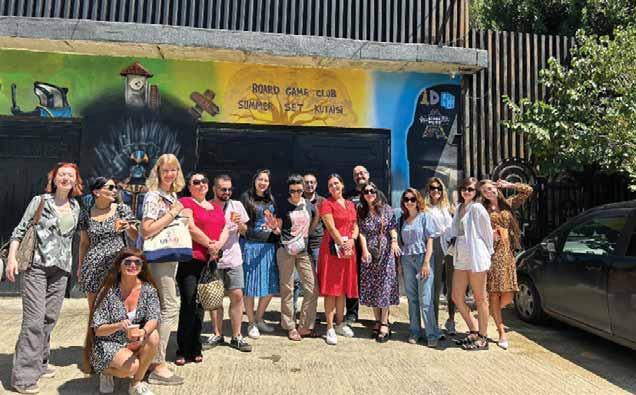
As part of the media tour, journalists visited businesswomen in Tbilisi and various cities of western Georgia: Gori, Khashuri, Terjola, Kutaisi, Senaki, and Zugdidi. They got to discover in detail comprehensive information from both the beneficiaries and the project representatives.
On the first day of the media tour, journalists visited beneficiaries Veriko Bazali, Sofo Talakhadze, and Sofo Bardavelidze.
“Hippo Velo” is the initiative of Veriko Basali, a beneficiary of the Young Entrepreneurs School, which was established in 2021 and is a bicycle service center where bicycle enthusiasts can repair their vehicles and buy various accesso-
ries and parts. “Hippo Velo” is a large community of cycling enthusiasts, which aims to popularize this direction and develop cycling culture in Georgia.
“SofYoga” studio is located in the city of Gori and offers yoga lessons to those interested. In addition to studio sessions, SofYoga also offers a remote, online service that is tailored to clients’ personal needs. The studio adds video series to make the training process as easy as possible for students.

Sofo Bardavelidze is a novice female entrepreneur who owns a laser epilation office “Skinova” in Terjola. In the future, she wants to expand her business and offer even more diverse services in the field of beauty and self-care to the population of Terjola. She loves her work and that’s why she is honest toward customers – she offers high-quality service, safety, and comfort.

On the second day of the media tour, journalists visited Khatia Khardzeishvili, Shorena Chijavadze, Tamar Meskhia, Nano Misabishvili, and Ekaterine Farulava.
“Mathes Marani” is a tourist facility located in Banoja village, in Imereti, which offers customers local wines, culinary master classes, and tasting service. The founders of the winery actively participate in various awareness-raising training and programs, such as the USAID YES-Georgia program, which has been actively serving the empowerment of women entrepreneurs for years. Khatia Khardzeishvili is a member of the Network of Women Entrepreneurs Program.
The USAID YES-Georgia program
turned out to be an interesting step for Shorena Chijvadze, where she attended entrepreneurship training with her daughter and became a beneficiary of the program. Now Shorena has her own sewing atelier “Jacquard”.
Intelligent board games club “Summer Set Kutaisi” started 7 years ago for Tatia’s first child, seeing her taking care of their informal education from an early age and searching for and buying educationalcognitive toys. As a result, she and her husband came up with the idea to write a project aimed primarily at creating a board game club and popularizing modern board games as a means of healthy entertainment, and at the same time using intelligent board games as a means of informal education, social skills and creative thinking development of adolescents.
Furniture enterprise “Nysa Studio” Nano Misabishvili started her activity at the end of 2020, during the pandemic, as a hobby, and then turned it into a profitable business. Busy creating art and handicrafts in her free time, she decided to turn her hobby into a business, and this is how “Nisa Studio” was introduced to customers in 2021. Today, a small wooden furniture enterprise has been established in Samegrelo, in the city of Senaki, and work is underway to modify the business model.
Dried fruit and vegetable candied plant “Kopeshoni”– Ekaterine Farulava is a doctor from Sokhumi and lives in Zugdidi. She worked professionally for 25 years and then decided to try something new. Initially, she searched the Internet
for the recipes that she later used to start her work, although she significantly modified the recipes that were available from various sources in her own handwriting. After her new product was liked not only by family members but also by wider society, she decided to take this activity to the next stage and start a business. Today, Ekaterine produces different types of Succades.
On the third day of the media tour, journalists visited Tatia Janashia and Ekaterine Khutkubia.
Sewing salon “T.J Atelier” – Tatia Janashia is a young entrepreneur who learned hot to cut and sew herself and started working in a small room with an old sewing machine.
Later, Tatia learned about the USAID YES-Georgia “School of Young Entrepreneurs” program. After successfully completing the training course and reaching the finals, she was financed by the program which was used to expand her business – she purchased the basic equipment needed for the activity and moved to a new space. Despite a number of difficulties, Tatia continues her work
successfully.
Ekaterine’s brand “Skyri” offers customers a wide range of natural dried fruits made from Georgian fruit raw materials, tylapi, churchkhela, dried candies, and various types of dried fruit with chocolate.

ABOUT THE PROGRAM:
The goal of the program is to increase the number of young and female entrepreneurs in the country through the development of entrepreneurial skills, access to finance, knowledge, and experience sharing.
USAID’s program – “Supporting Youth and Women’s Entrepreneurship in Georgia” (USAID YES-Georgia) supports the economic empowerment of Georgian youth and women and the economic development of the country by encouraging innovation, promoting entrepreneurship, and raising the level of selfemployment. The project is in its 8th year in Georgia and is being implemented by the Crystal Foundation, with financial assistance from the American people, USAID, and the Women’s Global Development and Prosperity (W-GDP) initiative. Additional financial support to the project is provided by the financial inclusion organization “Crystal”. By 2024, more than 2,500 women entrepreneurs under the program will have better access to knowledge, finance, and business services, enabling them to transform their businesses into higherincome enterprises.
Life in an Uncertain World
OP-ED BY NUGZAR B. RUHADZE
Nobody hates pessimism as much as I do, because I am an inveterate optimist - both genetically and by upbringing. But there are things around that I can’t help considering without a sense of doubt and ambiguity.
Take, for instance, the information that hits our brains and nervous system via the media of mass communication: it is practically impossible for an average consumer to discern between truth and falsity while taking in the words flowing from the politically engaged journalistic lips. One can’t possibly digest everything that the world's infomachine produces on a daily basis, hence
we depend on what we are told by the so-called ladies and gentlemen of the press. And here is exactly where the problem comes: there is no way to make a winning guess about the reliability of the source.
Politics and Politicians! How do we know whether they are telling us the truth or feeding us with lies? One has to be tremendously educated and wellversed in political science to discern between the veracity and mendacity of a glib politician, talking to us in standard terms and trained emotionality, pressing on what they believe is the best way from nowhere to prominence.
At the end of the day, we are all politically exploited rabbits and guinea-pigs, forced to patiently endure what the politicians prompt us to do. But we have no way to guess definitively what is good and what is bad.
To survive, one has to have a job, and to make it a decent survival, one has to have a decent job, but no job is hundred percent guaranteed to be in place forever, whether it is within the governmental domain or in the realm of private business.
Yet another uncertainty that haunts us all the way to our last residing place is the vagueness of our education. It is extremely difficult to know, especially in our often-changing times, which path can best take us to the type of education that will someday translate into wellbeing. Doubtful is the knowledge that our teachers give us, because knowledge ages fast and can lose value unexpectedly; doubtful are the diplomas that we are awarded, because their acceptance may well fade away as soon as we pocket them; doubtful are today's professional skills, because they might
be obsolete tomorrow; and doubtful are the job markets where we want to sell our skills, because their content and character can alter in the twinkle of an eye. I don’t even know what is not doubtful in the world of education. Maybe knowledge of the alphabet and multiplication table are more or less steady, but even they might fail if the world continues changing at the pace it is now.
Our national geopolitical stance is uncertain, because we have no idea which option is best. We are just guessing, and we might be winners if we get lucky in this incipient new world order, but just as likely not. It sometimes occurs to the lost mind that God will help. Isn’t this huge uncertainty indigestible?
What about the interminable fight between the belligerent neoliberalism and the defending-itself conservatism?
Considering all relevant pros and cons in order to make a decision between the two can lead to headaches and bewilderment. For example, you don’t want anyone hurt due to their sexual orientation, and yet you may encounter odds preventing you from absolutely certainty in attitude. Attitudinal uncertainty!
Are we absolutely certain about the foods we consume or the medicinal ways and means we are faced with? Let’s ask ourselves, and those who supply them to us, the unsuspecting purchasers of those indispensable commodities. And finally, those gorgeously beautiful Georgian mountains! Who knows what they nurse in their depths as the disasters we cannot cope with!
Is there any chance with all that in mind we can believe that our future is firm and certain?
GEORGIA TODAY AUGUST 11 - 17, 2023 10 SOCIETY
Snow-Melt Pool
Some friends have just visited us to take in Svaneti for the first time before they leave Georgia. They asked me to accompany them as a guide to one of our famous waterfalls, the Shdugra branching set, which is above the top of Becho village. I gladly agreed: any excuse to visit this lovely valley and its almost constant views of Ushba! And it has been a few years since my last visit, when I stupidly forgot to check my camera battery before leaving and it died before we got close and so I had to make do with the phone camera. Not this time. The weather started off cloudless, and was quite hot for Svaneti, although quite a bit cooler than Georgia’s lowlands, which are humid this side of the Rikoti Pass, and dry in the east, but capable of
reaching 40 degrees C this time of year. Our nights now, by contrast, can still bottom out at 12 or 13… We drove as far as we could, which gets you now across the river to a charming log-cabin complex called Hikers Inn. Someone has gone to great lengths to make this a little paradise, your last food and drink stop before a few-km walk to the falls. There is no electricity except what a generator can provide, and I hope most or all of the woodcutting was done on the spot, to save transporting all those logs.
The Inn includes what you would expect: a shop and cafe offering hot and cold food and drinks. But there is so much more. A sauna! A dammed swimming pool and, below it, a trout pool where you can catch your lunch! Hammocks and deckchairs everywhere! Even a diving platform. True, I got into the pool to ankle depth and lost the feeling in my feet from the coldness of the water,
which is pure snow-melt. It was too much, even on this hot, hot day, and I chickened out. But all around me people, even children, were braving the chill, and not even screaming, as I would have, if breath had remained to me from diving in.

This failure was after the walk to the falls, though. It is a well-marked trail, largely through forest for nice shade, quite rocky but doable in sports shoes with no sticks, as I was. You go through a Georgian border guards’ checkpoint, but will only need to register and show ID if you intend spending the night past this point, which gets you very close to the border of the Russian North Caucasus.
Many people of various nationalities met us in both directions, as I had found recently when walking to the glacier base of Mt. Shkhara above Ushguli, Georgia’s highest mountain and source of the headwaters of the Enguri river. But now,
as then, it was never what I would call crowded.
I kept a lookout for new angle views of Ushba, my muse mountain, but from this walk you will only see his shoulder, which is what you also see from our house in Etseri. Nonetheless, one point showed me an ogre’s fanged face formed by the shadows on the planes of this shoulder at this time of day, which I found most gratifying. I am always looking for faces on Ushba or part of it, and this was one of these.
One of the best things about reaching as close to the falls as you can is the sudden wind and drop in temperature of about 10 degrees, a welcome respite on a hot sunny day. A branching path will take you up above them to a glacier, from which I suspect another view of Ushba will emerge, but that will have to wait for more willing walking partners. We walked back, had our pack lunches

in the pleasant shade of the border guards’ camp, and then returned to the Hikers Inn, where I lost my nerve for the freezing water. If I had sauna’d first, and got even hotter, I might have managed it; but the sunshine was really hot enough, and yet not enough to persuade me to dip. Oh well.
I highly recommend this place if you are ever in Becho: it’s worth a few hours if you have them, to see a unique and popular part of Svaneti. And cool right off.
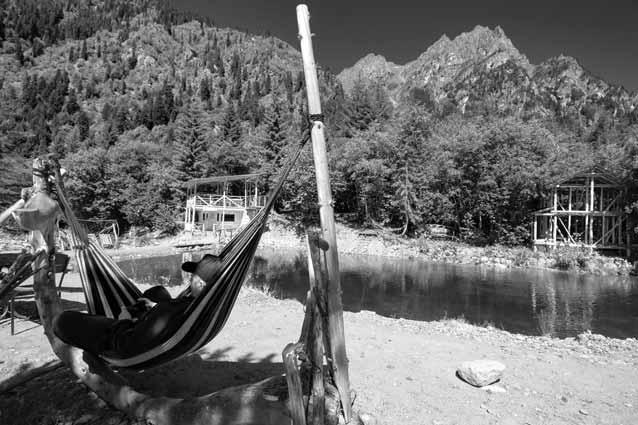
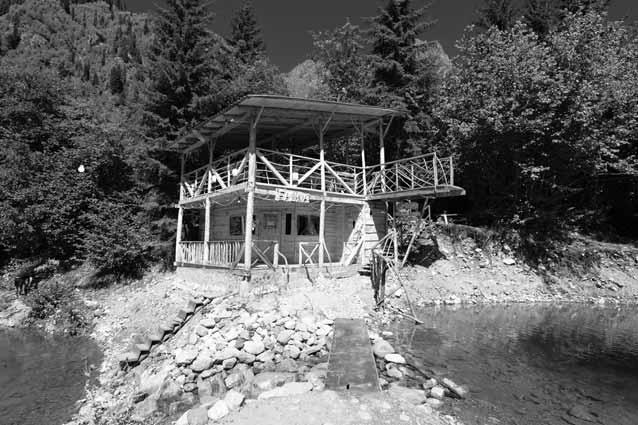
Tony Hanmer has lived in Georgia since 1999, in Svaneti since 2007, and been a weekly writer and photographer for GT since early 2011. He runs the “Svaneti Renaissance” Facebook group, now with nearly 2000 members, at www.facebook.com/ groups/SvanetiRenaissance/
He and his wife also run their own guest house in Etseri: www.facebook.com/hanmer.house.svaneti
PUBLISHER & GM
George Sharashidze
COMMERCIAL DEPARTMENT
Commercial Director: Iva Merabishvili
Marketing Manager: Natalia Chikvaidze
EDITORIAL DEPARTMENT:
Editor-In-Chief: Katie Ruth Davies
Journalists: Ana Dumbadze, Vazha Tavberidze, Tony Hanmer, Emil Avdaliani, Nugzar B. Ruhadze, Michael Godwin, Mariam Gorkhelashvili, Mariam Mtivlishvili, Erekle Poladishvili
Photographer: Aleksei Serov
Website Editor: Katie Ruth Davies
Layout: Misha Mchedlishvili
Webmaster: Sergey Gevenov
Circulation Managers: David Kerdikashvili, David Djandjgava
ADDRESS 1 Melikishvili Str.
Tbilisi, 0179, Georgia
Tel.: +995 32 229 59 19
E: info@georgiatoday.ge
F: GeorgiaToday
ADVERTISING & SUBSCRIPTION
+995 555 00 14 46
E-mail: marketing@georgiatoday.ge
Reproducing material, photos and advertisements without prior editorial permission is strictly forbidden. The author is responsible for all material. Rights of authors are preserved. The newspaper is registered in Mtatsminda district court.
Reg. # 06/4-309
GEORGIA TODAY AUGUST 11 - 17, 2023 11 SOCIETY GEORGIA TODAY
BLOG BY TONY HANMER
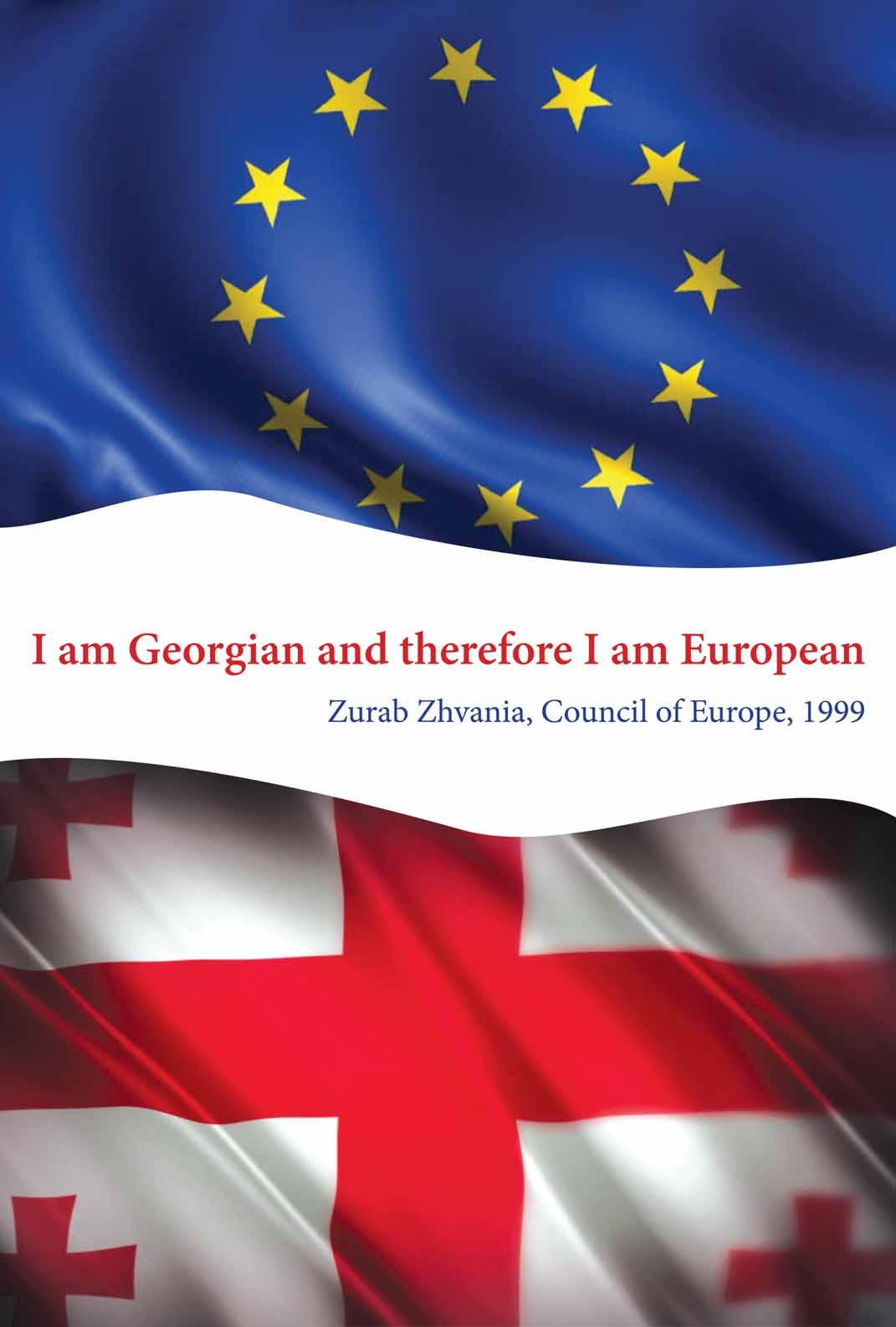





 BY MARIAM GORKHELASHVILI
BY MARIAM GORKHELASHVILI





 INTERVIEW BY VAZHA TAVBERIDZE
INTERVIEW BY VAZHA TAVBERIDZE
 BY MARIAM GORKHELASHVILI
BY MARIAM GORKHELASHVILI
 BY MARIAM GORKHELASHVILI
BY MARIAM GORKHELASHVILI
























